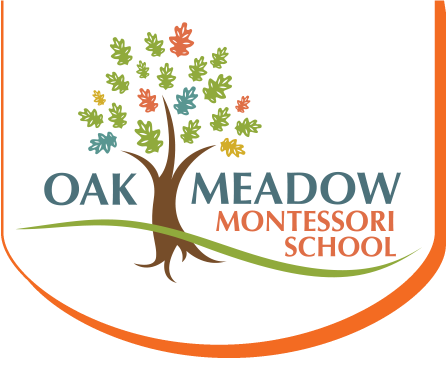Montessori Beginnings • Unlimited Destinations
Walk into any Oak Meadow classroom, on any day, and you will immediately recognize that something special is going on. From the youngest learners to those nearly ready for high school, children are completely engaged. Side by side, you will see quiet independent investigators and enthusiastic collaborators—all with an equal intensity of focus and sense of purpose. They are guided, but not directed. There is freedom, yet intentionality. There is courtesy and kindness and also a strong sense of self. There is real, relevant work going on and continual demonstrations of progress.
The teaching principles that Maria Montessori pioneered in the early 1900s are still at the forefront of progressive educational thinking today. Her research on childhood development identified differentiated approaches to learning as a key to student success, and she innovated a classroom structure that channels each child’s natural curiosity. As modern research advances our understanding of how children learn, we also advance our practice of the Montessori model at Oak Meadow. Here, you will find a program that is infused with both the spirit and architecture of the Montessori classroom experience, while preparing students for the unique challenges of our time. Every day we are constructing the foundation for a lifetime of intellectual and personal growth. When you begin here, you can go anywhere.
Academic Mastery
A planned process assures success.
From the first day of Beginners (15 mos. – 3 yrs.) through the last day of eighth grade, Oak Meadow students are on a continual path of progress. Academic subject areas are developed sequentially—with students advancing to their own next level of achievement—day-to-day and year-to-year. As a result, there are no limits to personal goals or students’ ability to attain them. Oak Meadow students consistently prove their intellectual readiness for challenge—at school, at home, and in the world.
Cultivating Character
A planned approach supports social and emotional growth.
Maria Montessori understood the need for schools to foster all aspects of a child’s growth and development. This imperative is a cornerstone of Oak Meadow’s program, so building confidence and a strong moral compass is as important as instilling a love and capacity for scholarly pursuits. From modeling what it means to be a good friend in Beginners to discussing prejudice and equity in Middle School, students practice and hone the tools to navigate any social field.
Guided Independence
A planned classroom leverages individual motivation.
Oak Meadow teachers know exactly what benchmarks need to be met at every developmental crossroads—both with regard to important 21st century competencies, as well as to state and national standards. They also know that when the benchmarks are met is less important than how they are met. As a result, teachers prepare varied lessons that inherently guide and require students to independently build necessary skills and knowledge. Their preparation includes an intentionally designed classroom environment with materials and activities that intuitively fulfill each lesson’s goals. As children gravitate to areas that spark their curiosity, they feel in control of their own learning and become more invested in the process.
Always Where You’re Supposed to Be
A planned sequence ensures that competencies are universal, but next steps are personal.
Maria Montessori knew that all children learn differently. She also knew that ‘different’ can refer to the approach, to the age at which children are ready to learn something, and to the speed at which they are best able to learn it. As such, she designed the multi-age classroom which provides for individualized readiness and growth. A series of lessons, created for three-year continuums, gives students maximum flexibility on their path to mastery. Students thrive as a result of their ongoing personal achievements, regardless of where they are relative to their peers. Additionally, relationships are stronger when developed over the course of three years: teachers know their students better as learners and as individuals, and, as younger students become older students, they help their classmates while practicing valuable leadership skills.
Space & Time
A planned environment allows students to practice and reflect on what they learn.
Repetition—not 100 times in a row—but revisiting concepts from different perspectives, throughout the year and throughout a continuous curriculum—gives students a depth of understanding that transcends the potential of a traditional textbook or a single lesson. Oak Meadow’s program includes time to look at topics in multiple ways, with increasing levels of complexity. It also includes time to process and reflect, to make connections and appreciate nuance. When children start to see themselves as part of a community in Children’s House, they can use their emergent awareness to understand story themes, navigate a conflict with a friend, and appreciate the consequences of their actions.
Applied Learning
A planned strategy helps students use new knowledge in increasingly sophisticated ways.
Teachers are always moving kids forward, helping them pack up what they’ve learned and bring it to the next level. At every juncture, they unpack familiar concepts and apply them to new situations—reinforcing an essential knowledge base and increasing capacity for abstract thinking. The invisible scaffolded continuum assures competence across all disciplines. Whether a child is learning to put on a coat and rain boots without assistance or using an understanding of soil composition to grow organic vegetables in a community garden, Oak Meadow students take what they learn to next grades, next schools and out into the world.
All the Right Stuff
A planned curriculum builds knowledge of traditional subjects in untraditional ways.
At Oak Meadow students learn essential skills and knowledge across the full range of academic disciplines. Math, science, English language & literature, history, geography, and Spanish are taught with developmentally appropriate content and sophistication. Integrated throughout every child’s experience, with equal emphasis, are activities that cultivate other important aspects of unfolding hearts and minds: sensorial explorations; visual and performing arts; physical education and movement; an intentional social and emotional curriculum; practical life skills (from shoe-tying to community service, to entrepreneurship); interdisciplinary STEM studies; and our hallmark nature-based learning program that teaches the science of our natural world, connects individuals to their surroundings, and inspires stewardship.
Go Anywhere
A planned beginning assures a brighter future.
The students who begin at Oak Meadow now will welcome the 22nd Century in their lifetimes. That’s a sobering scenario for educators. Here, we take our responsibility seriously and are committed to preparing children for their futures—not with a crystal ball, but with a strong character, a full and flexible skillset, and the confidence and motivation to use it. While goals are individualized, and benchmarks are achieved at varying pace, we recognize the relevance of universal standards and appreciate the importance of next schools. Every year we are proud of our students who graduate with demonstrable proficiency and fearlessly embrace their world. They know they are ready; they might not know what the future holds, but they know they can go anywhere.
Montessori Resources
Links
- Maria Montessori Blog – www.mariamontessori.com
- American Montessori Society – www.amshq.org
- Association Montessori Internationale – http://ami-global.org/
- Association Montessori USA – http://amiusa.org/
- Montessori Science – http://www.montessori-science.org
- Montessori, Why Not?
- Why Montessori Education is Priceless
- A Parent’s Decision for the Five-Year-Old
Books
- Turning Education Inside-Out: Confessions of a Montessori Principal (J. Ross, 2016) by Judy Dempsey
- The Absorbent Mind (Heny Holt & Co., 1995), by Dr. Maria Montessori
- Montessori Madness! A Parent to Parent Argument for Montessori Education (Sevenoff, 2009), by Trevor Eissler
- Montessori: The Science Behind the Genius (Oxford University Press, 2008), by Angeline Stoll Lillard
- Discovery of The Child (Fides, 1967), by Dr. Maria Montessori
- Drive (Penguin, 2011), by Dan Pink
- A Whole New Mind (Penguin, 2006), by Dan Pink
- Brain Rules (Pear Press, 2014), by John Medina
- The Schools Our Children Deserve: Moving Beyond Traditional Classrooms and “Tougher Standards” (Houghton Mifflin, 2000), by Alfie Kohn
- Punished By Rewards: The Trouble with Gold Stars, Incentive Plans, A’s, Praise, and Other Bribes (Houghton Mifflin, 1999), by Alfie Kohn
Videos / Speeches / Presentation
- Changing Education Paradigms (11:41), by Sir Ken Robinson
- Bring On the Learning Revolution (17:58), by Sir Ken Robinson
- Educational Videos on the Montessori Method from the American Montessori Society
- Drive: The surprising truth about what motivates us (10:48), by Dan Pink
- Superwoman Was Already Here (6:14), by Daniel Petter-Lipstein
- Montessori Madness (5:44), by Trevor Eissler
- Are We Teaching STEM Wrong? (1:05:52)
- American Montessori Society
Media Coverage
- “The Single Most Innovative Concept in Education is at Least 100 Years Old” Quartz
- “The Montessori Mafia” The Wall Street Journal
- “The Single Best Idea for Reforming K-12 Education” Forbes Magazine
- “Montessori Education Provides Better Outcomes than Traditional Methods” Science Magazine
- “Develop Leaders The Montessori Way” Harvard Business Review Blog
- “How to Shape the DNA of a Young Company” The New York Times
- “Montessori: The Missing Voice in the Education Reform Debate” Huffington Post





